“Millions of Americans are betting real money on online casino games marketed as “sweepstakes.” Users, regulators and the casino industry are fighting back.”
The Washington Post, 11/27/2024, by Rick Maese – It was only about a year ago, Erik says, that he started gambling online. He wagered just $10 or $20 at first but soon found himself putting up hundreds of dollars at a time — money, he says, he couldn’t afford to lose.
“It’s almost like I blacked out,” he says. “I remember how fast it went. It’s such an embarrassing thing. These are such childlike little games. I don’t even know how it happened.”
It’s a familiar tale. But Erik’s habit doesn’t involve casino visits, basement poker games or mobile sports betting. Though online casino games are illegal in most every state, Erik is among millions of Americans who have played slots and blackjack online, winning and losing real money faster than they could in Las Vegas.
Erik was playing what the gaming industry calls a “sweepstakes” game.
With names such as Chumba Casino and McLuck, sweepstakes social casinos are at the forefront of a booming, multibillion-dollar industry operating in a legal gray area. Players have the option of playing for free — or they can feed money into the games, unlocking a secondary “currency” that effectively turns their smartphone into a slot machine, blackjack table or roulette wheel. Sweepstakes operators aren’t regulated, licensed in the United States or subject to gaming taxes, and though they target American consumers, the biggest ones operate from offshore locales including Cyprus, Malta and Gibraltar.
Erik, a 41-year-old transportation professional from St. Louis, is part of the growing army of players who have spent hours playing the games — and watched their bank accounts grow or shrink in the process. He spoke on the condition that his last name be withheld because his family and employer are unaware of the addiction he says has upended his life. He has maxed out three credit cards, he says, taken out a personal loan and, all told, has lost nearly $100,000 in the past year. He provided screenshots of past-due credit card bills and bank statements showing thousands of dollars in payments for sweeps coins, often multiple deposits over the course of a single day.
“This turned me into a person I never thought I’d be,” he said.
Unlike regulated sportsbooks and casinos, sweepstakes casinos don’t have to offer responsible gambling services, age verification or other consumer protections. Yet more than a million Americans play each month, and the games drew nearly $6 billion in player purchases last year, including $1.9 billion in net revenue, according to Eilers & Krejcik Gaming, a research analyst firm. The firm predicts those numbers will more than double next year.
Australia-based Virtual Gaming Worlds (VGW), which operates Chumba Casino, LuckyLand Slots and Global Poker, alone brought in $4 billion in revenue in 2023, including $322 million in net earnings, according to its most recent financial report. Even amid legal challenges, it’s now a primary sponsor of Ferrari’s Formula One team and enlists celebrities Ryan Seacrest, Michael Phelps, DJ Khaled and others as pitchmen.
The boom has caught the attention of the regulated gaming industry, which has long seen online casino games as its most lucrative potential market. Only seven states have legalized and licensed online casinos, even as online sports betting thrives. Yet legal iGaming generated $6.1 billion in gross revenue last year, according to the American Gaming Association (AGA), the trade group representing many of the largest companies in the traditional, regulated gaming industry. Legal sports betting, available in five times as many states, generated $11 billion, the AGA says.
The AGA recently asked states to investigate the sweepstakes games, and states have begun responding, with some accusing the companies of flouting gambling laws and ordering them to cease operating.
“They look like a casino, talk like a casino, walk like a casino,” said Shawn Fluharty, a West Virginia delegate and president of the National Council of Legislators from Gaming States. “And they’re trying to tell us they’re not a casino.”
The sweepstakes industry insists that its offerings are misunderstood and that its core product is not gambling but social gaming.
“We’ve got full confidence in our compliance with all laws and regulations where we operate,” Tim Moore-Barton, VGW’s chief operating officer, said in an interview. “… We don’t view this as gray at all.”
That view is being tested by the casino industry, states and users themselves, who are increasingly turning to the courts to recover their losses and challenge the legality of the sweepstakes games.
Daniel Wallach, a Florida-based gaming attorney, said the model is a ruse and operators are peddling in gambling under the guise of legitimate sweepstakes. “It’s a stretch to even call it subterfuge because it’s so easy to pierce,” he said.
“It not only skirts the edges of the legality but is so far over the cliff that I’m surprised that state attorneys general and federal prosecutors haven’t seized upon this yet,” he added.
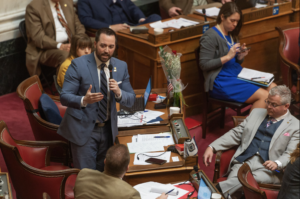
Free vs. ‘sweeps’
To understand sweepstakes casinos, it helps to first understand “social casinos,” which offer free-to-play games such as slots and blackjack. There, users can purchase virtual currency to unlock certain features, not unlike in countless other mobile games. But they can’t win or lose real money.
“Sweepstakes games” are social casinos with a twist. Users can play with one of two types of currency: virtual “coins” that have no value, as well as a second tier of currency, called “sweeps” coins, that can be cashed out.
Signing up is typically easy. Chumba verifies users’ email addresses and asks them to attest that they are 18 or older — no ID or Social Security number required, as on sports betting apps. Then users get a pop-up offer: For $10, they can purchase 10,000 gold coins. The coins technically have no value. But in exchange for making the purchase, the user receives 30 sweeps coins, which can be used to play for real money.
The sweeps coins are labeled “free,” and users can toggle between gold coins and sweeps coins. Those playing the casino games for actual money, though, compete separately from those playing for fun.
The registration process takes a couple of minutes. Only users who try to withdraw money have to submit a form of ID.
Having two forms of currency is confusing — and key to the enterprise, according to stakeholders. To meet the legal definition of gambling, a game needs three elements: prize, chance and “consideration,” the industry term for the cost of playing a game.
Sweepstakes operators claim their game has no “consideration” — that the product is the social casino and the sweepstakes are simply a vehicle to help promote that product. They cite the popular McDonald’s Monopoly game or Starbucks’ frequent sweepstakes contests.
“Instead of selling coffee and running sweepstakes to sell more coffee, Chumba sells social casino currency and runs the sweepstakes to promote the sale of the social currency,” said Chris Grove, managing partner with Acies Investments, whose portfolio includes Jefebet, a sweepstakes casino aimed at the Hispanic market, and Fliff, a sweepstakes sportsbook.
Grove points out that people spend more than $7 billion annually on social casinos, according to the Eilers & Krejcik analysis, knowing they have no chance of winning real money. Only half of VGW’s million monthly users ever make a purchase, Moore-Barton said, unlocking the ability to win and lose money.
“People might wonder: ‘Oh, why would anyone ever do that? I would never pay money to play slots that you can never win,’” Grove said. “But the ‘why’ of it is kind of irrelevant. Because people do.”
Jon Kaplowitz, CEO of Clubs Poker, a social poker site that includes a sweepstakes offering, recently suggested that only 1 to 5 percent of social casino users ever pay to play.
“The rest play for free,” he said, “versus the regulated gambling market where money exchanges hands 100 percent of the time.”
So if not gambling, then what are the sweepstakes games?
“I think they’re entertainment,” said Kaplowitz, a former executive for Penn National Gaming. “They’re a way to play with friends online for free.”
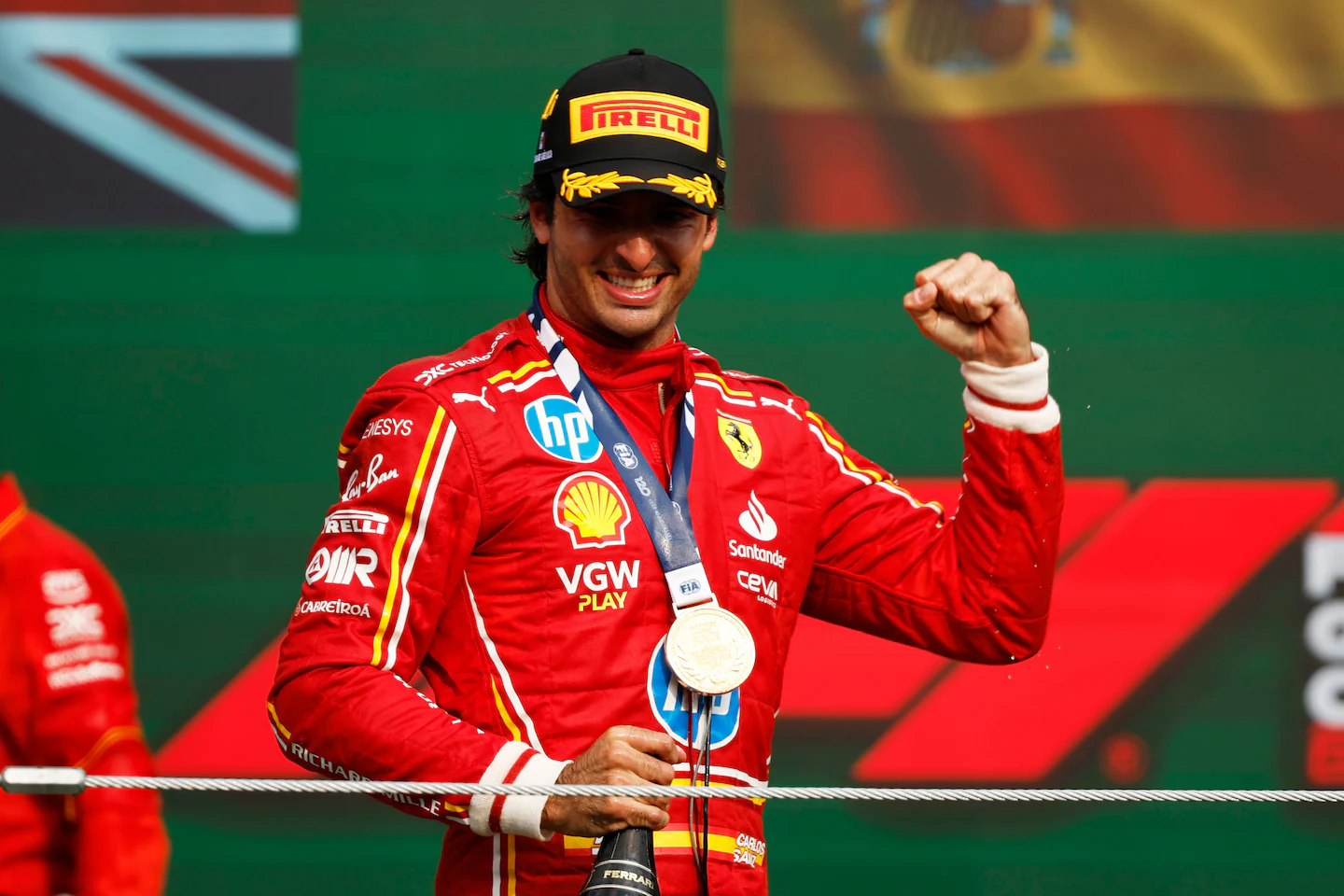
A playboy’s play
VGW is the brainchild of Laurence Escalante, the company’s 42-year-old founder and chief executive. He’s among the richest people in Australia, with a net worth reportedly nearing $4 billion and a toy box that includes private planes, helicopters, boats, flashy watches and a fleet of sports cars — Ferrari, McLaren, Lamborghini and Pagani among them.
When VGW launched as a social games company in Perth in 2010, sweepstakes were not part of the equation. According to Ben Reichel, the company’s former chief executive, Escalante saw an opportunity in U.S. law to use sweepstakes to promote and grow the business. (Sweepstakes casinos are illegal in Australia.) The company sought advice from U.S.-based lawyers.
“The Board at the time was very cautious … because sweepstakes had never been used to promote social casino games,” Reichel said in an email. “Eventually the Board was confident of the legality of the model — otherwise it would never have been deployed.”
The company launched its products in the United States in 2017, operating under a gaming license from the Malta government. It flourished during the coronavirus pandemic, reporting a net profit of $115.8 million in the back half of 2020 — a 60 percent increase from the previous year. By 2021, Chumba Casino alone had more than a million players, largely from North America, and paid out nearly $500 million in prize money.
Competition followed. VGW’s market share has fallen from 90 percent in 2020 to 50 percent now, according to Eilers & Krejcik, though it’s still the runaway market leader, with $4 billion in revenue this year.
Critics say the sweeps industry has been able to grow so rapidly because it isn’t subject to the
same oversight as the regulated industry. Keith Whyte, president of the National Council on Problem Gambling, a nonprofit advocacy organization funded in part by the gaming industry, said sweepstakes operators are exploiting “an antiquated definition of gambling” and “an antiquated definition of sweepstakes.”
A key component of any sweepstakes promotion is the phrase “No purchase necessary.” For sweepstakes casino players, making a purchase is the easiest way to collect “sweeps” coins. But it’s not the only way. Users also can request free game play by mailing a letter to an address — which some choose to do, though the process takes much longer than simply buying sweeps coins on the site.
Sweepstakes casino Wow Vegas invites players to send a letter with specific instructions — only black ink and a No. 10 envelope — to 1445 Woodmont Lane, a one-story gray house on a residential street tucked in an otherwise industrial area of northwest Atlanta. A sign out front identifies the home as the location for PhysicalAddress.com, a company that provides physical addresses to third-party companies.
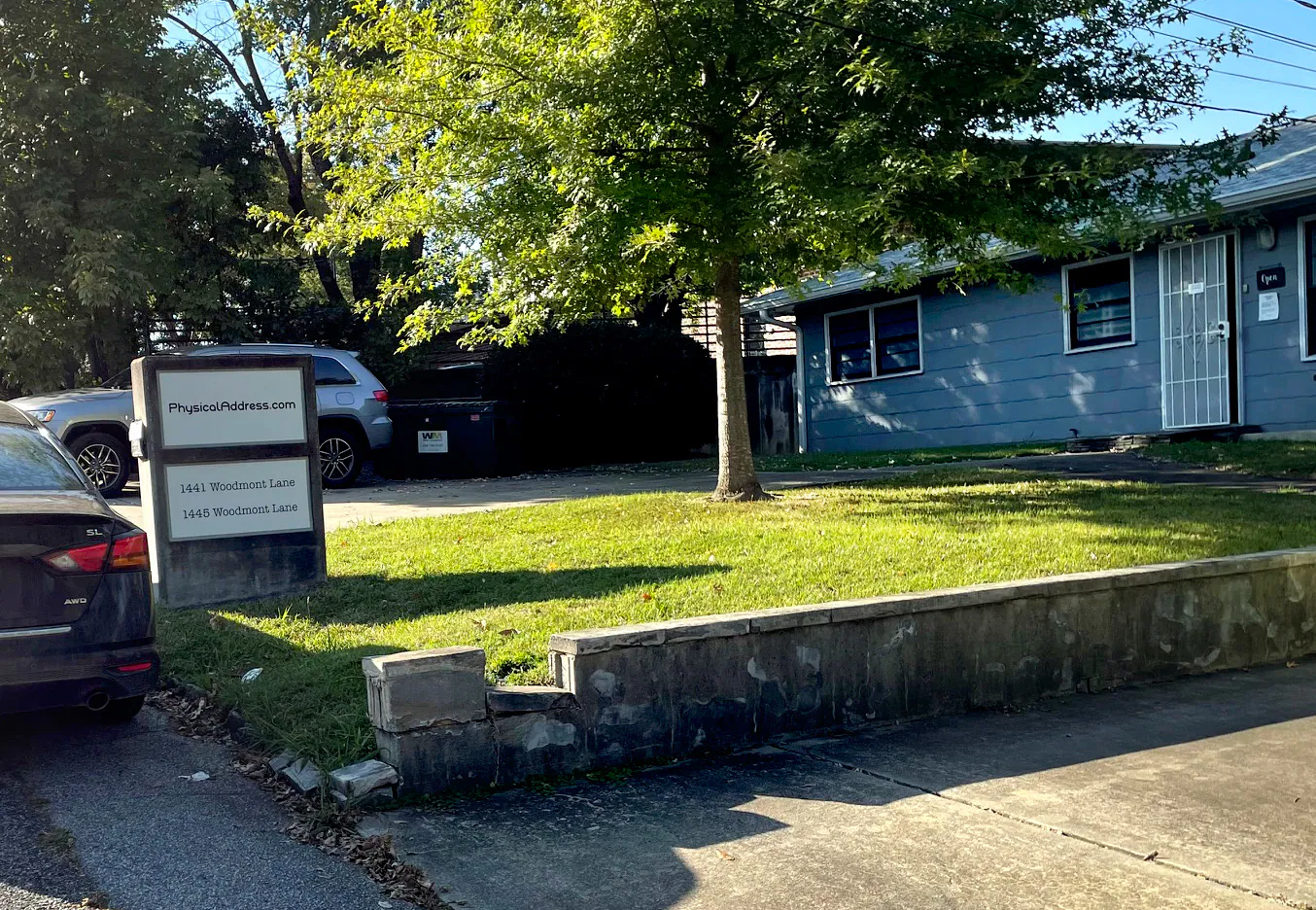
“People can use this address to file their business with the state,” the person said, “so that’s why they say they’re here, but they’re not.”
Asked whether they could provide contact information for a Wow Vegas representative, the person said, “I can’t tell you.” Emails sent to a company media representative were not returned.
Chumba and LuckyLand use a post office box in Portsmouth, New Hampshire. Pulsz has a P.O. box in Manchester, New Hampshire, as do McLuck and Rolling Riches. Sweeptastic has a box at a shipping and mailing business in Amherst, New York, while Stake.us uses a similar business in Dallas.
“It stunned me with how non-fancy these places are,” said Wallach, the attorney. “It’s almost like a secretive thing where they just have a shell presence. It really underscored to me how off-the-grid these companies are.”
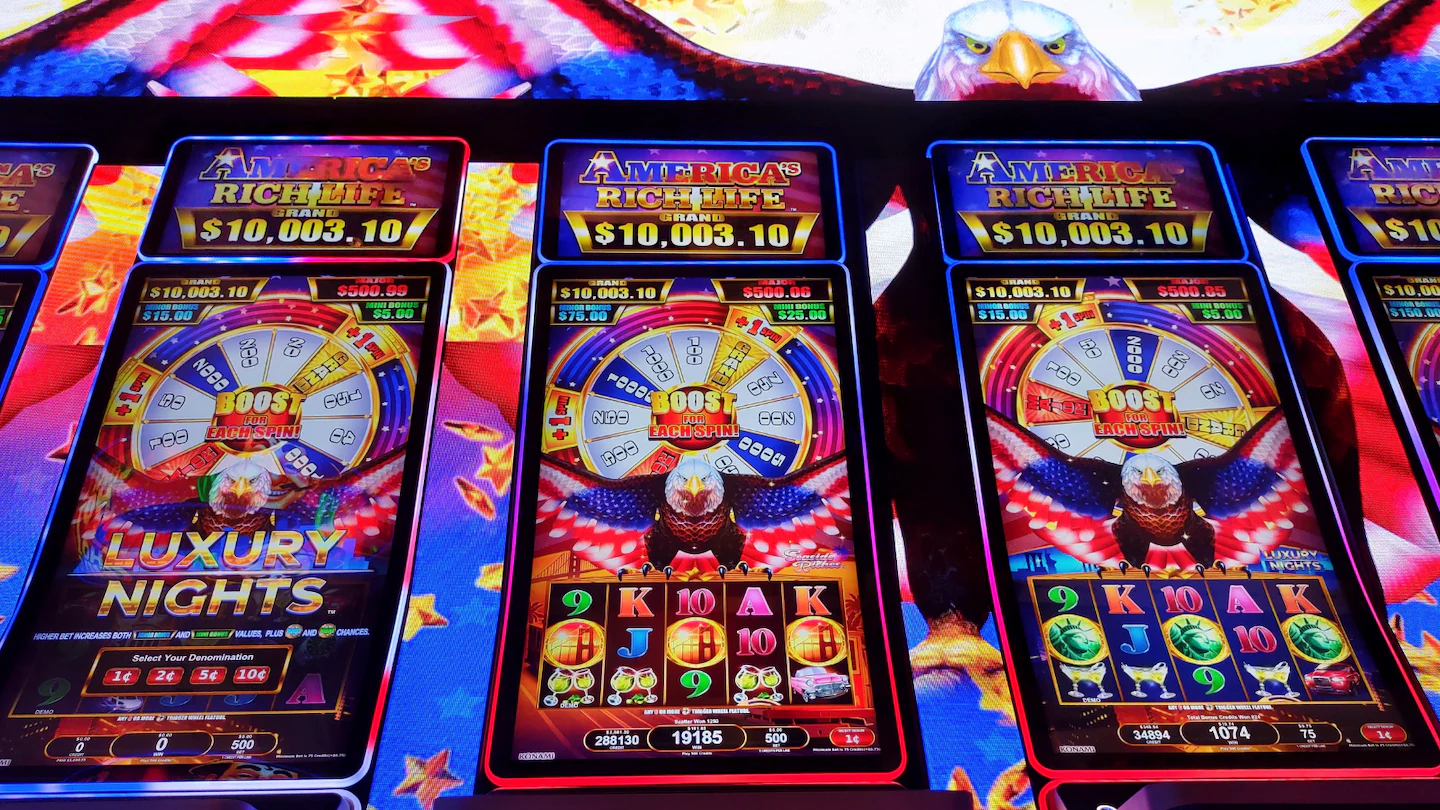
Fighting back
In May, the AGA sent letters to the gaming commissions and attorneys general offices in every state, encouraging them to investigate. The memo stopped short of saying the sweepstakes offerings are illegal but urged the offices to consider “legislation to prevent unlicensed operators from exploiting loopholes in sweepstakes regulations to offer online real money gambling.”
“Consumers are being deprived of protections and states are forgoing significant tax and revenue opportunities as this gambling replaces that conducted through regulated channels,” the memo stated.
Brick-and-mortar casinos in Las Vegas and elsewhere have strict rules that dictate payouts and what percentage of money needs to be returned to the player, critics point out. The sweeps casinos might not adhere to any such standards, and if they do, they’re probably governed by some faraway gaming authority. Those casinos also require gamblers to be at least 21; the sweeps games are available to anyone over 18.
“It’s almost like some drug company not going through FDA and just saying, ‘We did all testing ourselves — trust us,’” said Chris Cylke, the AGA’s senior vice president for government relations.
Only four states have barred the sweepstakes games, including two that offer (and collect tax from) legal iGaming. Several other states’ regulators, in interviews, said they’re aware of the sweepstakes issue but declined to say whether or how they may act.
The sweepstakes operators formed a trade association in August, though it doesn’t include VGW. The company says it rejects the AGA’s assertions but welcomes regulation, which Moore-Barton said “adds legitimacy to the business model.”
For now, no court has ruled definitively on the social casinos, and federal regulators haven’t taken up the matter.
“It’s legal until it’s not,” said one longtime state regulator, who spoke on the condition of anonymity because he was not authorized to discuss the matter.
Michigan, where iGaming is legal, was among the first to bar the sweepstakes operators, sending VGW a cease-and-desist letter in December 2023. In addition to the lost tax revenue, the sweepstakes operators made no attempt to follow the guidelines in place for legalized online casinos, which include consumer protections and a minimum age restriction of 21, Kurt Steinkamp, chief of staff for the Michigan Gaming Control Board, said in an interview.
“They’re not playing by the same rules,” he said. “They don’t have the same controls in place when it comes to anti-money laundering, player protections, problem gambling, know-your-customer requirements, age verification — all of the things that exist in the legal market.”
VGW’s games are still available in all but five states. The company says it did not exit any state because of concerns over the legality of its products.
“In the handful of states where we have exited, we’ve done so with respectful disagreement with the regulator or the relevant body that we’ve spoken to, and we’ve done so in the best interest of all our stakeholders,” Moore-Barton said.
Players who have lost money playing sweepstakes casinos have recently filed lawsuits in a dozen or so states, saying the sweepstakes operators violated state gambling regulations and unlawfully collected money from consumers. None has gone to trial, though several have been sent to arbitration, as dictated by the games’ terms of service.
In Kentucky, though, players did claw back some money, including a woman who claimed she lost $7,000 playing Chumba Casino. In separate cases, four operators admitted to no wrongdoing in Kentucky but agreed to pay users a combined $14.2 million. VGW agreed to the largest payout — $11.75 million — in a class-action suit and said it settled to avoid additional legal costs and risks of continued litigation.
Yet sweepstakes companies continue to operate in the state. Spokespeople for the state’s department of charitable gaming and the Kentucky Horse Racing and Gaming Corporation said their offices had no authority over sweepstakes, and the state’s attorney general’s office said in a statement, “Our office has not received any complaints relating to sweepstakes social casinos.”
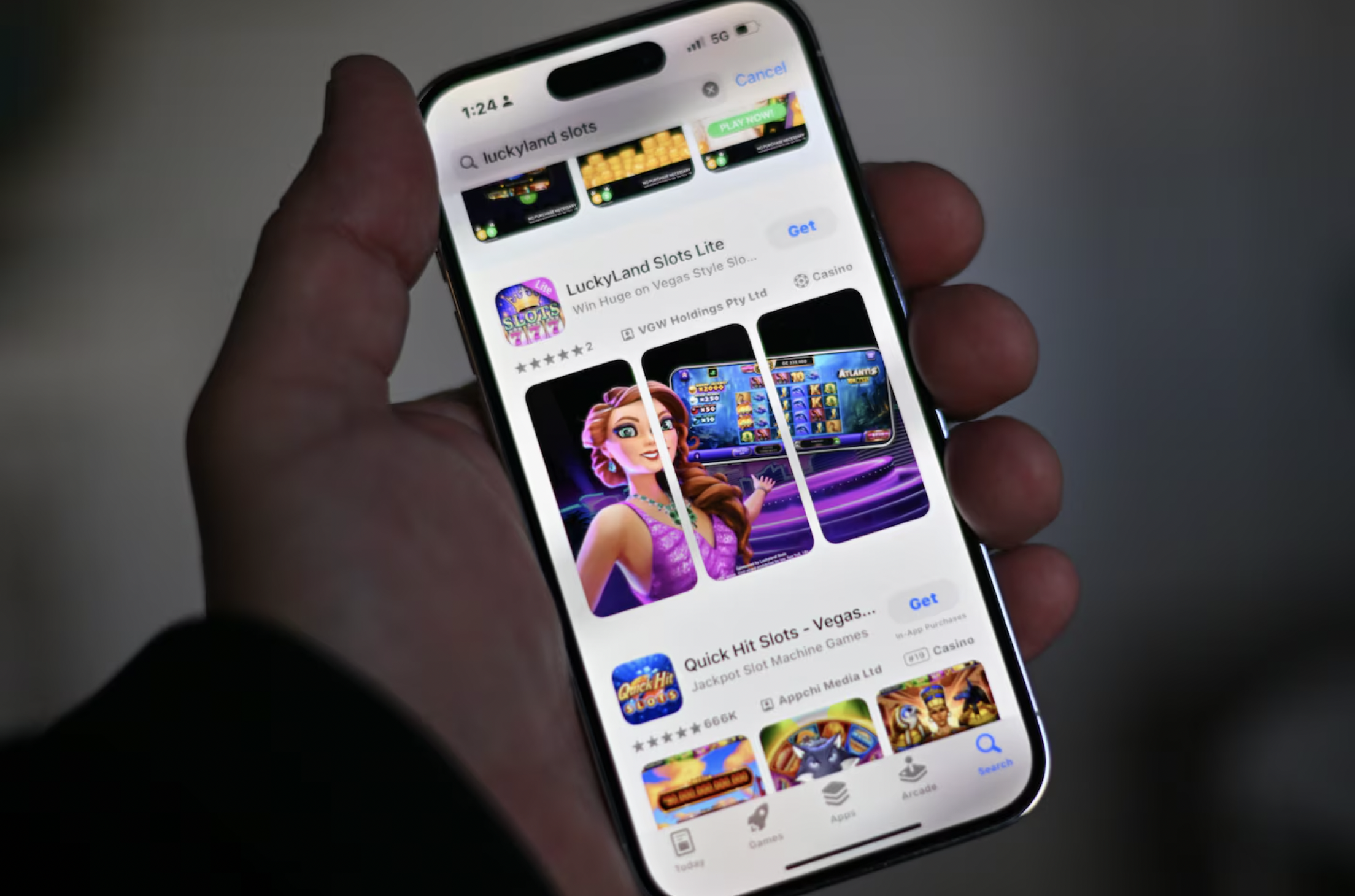
The only game in town
Zach, a 23-year old accountant in the Pacific Northwest, says the casino-style games move too quickly and are too accessible. As his playing habits evolved into what he calls an addiction, he found himself constantly pulling out his phone — at dinner, during meetings, in the restroom — trying to replicate big wins or recover big losses. Zach also spoke on the condition his full name not be used.
“It’s the classic problem gambling,” he says, “except you don’t have to go to the casino. … A lot of times, it felt like I was on autopilot, where it would just feel more like a mobile game — Candy Crush or something — than actually gambling money.”
Similarly, Erik found himself idly playing at all hours, pushing a button and watching the animated graphics spin on the screen in front of him.
“I just couldn’t stop,” he says. “I let myself get completely devoured. It’s just ridiculous.”
Critics say the sweepstakes operators can be predatory. People susceptible to problem gambling — especially young people — can’t avoid the advertisements and allure of easy-to-play games, they argue. And, as Whyte points out, they’re sometimes the only game in town — as in California and Texas, where even online sports betting is not permitted.
“These are all customers the legal market can’t get to. Some of these companies we’re seeing much more youth-focused websites with youth-focused celebrities,” he said. “When it looks like they’re trying to appeal to youths, that’s not by accident; that’s by design.
While companies such as VGW say their offerings appeal to users of all ages and don’t specifically target youths, the games often feature cartoon characters and colorful gameplay, and the companies advertise on social media sites such as Twitch, TikTok and Kick, where younger consumers congregate. The biggest companies, such as VGW and Stake, cross-promote heavily, making sponsorship deals with UFC and Formula One. According to the company’s most recent financial report, VGW spent $275 million on marketing alone last year.
Seacrest is the ambassador for Chumba, while Phelps, DJ Khaled and NBA players Paul George and Karl-Anthony Towns have partnered with VGW’s Global Poker brand. Drake is a celebrity endorser for Stake, which uses cryptocurrency in Canada but operates as a sweepstakes casino in the United States. Paris Hilton recently signed on to be the face of Wow Vegas. Her face is the only non-animated character on the casino’s website.
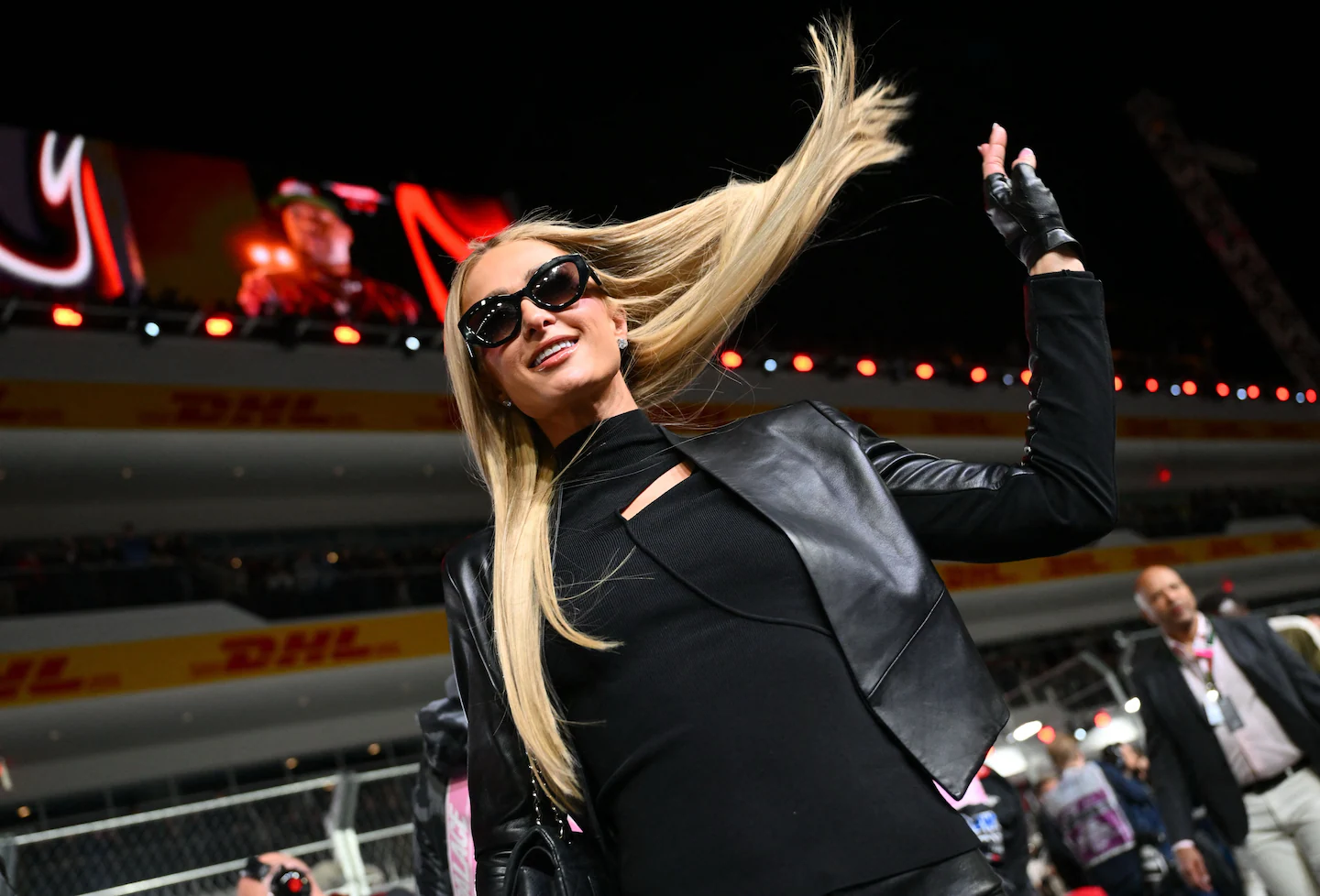
Any safeguards that are in place are largely voluntary. Moore-Barton defends VGW’s protections and protocols, saying the company “would hold up what we do, toe to toe, against the land-based operators.”
“Being a fully digital business in almost every sense, we have better transparency, better visibility, better controls around our players,” he said. “You can go into Vegas and you can walk onto a gaming floor and play cash. And it’s anonymous. … We know who people are at an incredibly early stage. We track every click, every transaction. We put the right protections and controls in place.”
Kaplowitz, the CEO of Clubs Poker, said his site and other social casinos use many of the same “best-in-class” tools as regulated gambling operators to protect consumers, including giving users the ability to self-exclude or limit their spending.
Still, unlike in forms of legalized gambling, no funds or other resources from the sweepstakes operators are earmarked for problem gaming. Unlike sports betting, there aren’t any restrictions on television advertising, either, and Chumba ads have aired in places with strict gambling laws in place, such as Texas.
“My concern is it’s coming at the expense of our children,” said Brianne Doura-Schawohl, a consultant whose clients include Campaign for Fairer Gambling. “My concern is communities bear the brunt. While the legal nuances get debated, how many kids or how many families need to be caught in the wake of these legal debates? And how many are never going to really understand that this was the catalyst of the issues because it just looks and feels like yet another game on a tablet?”
Gaming observers are watching the court cases closely and anticipate more states shutting the doors on sweepstakes operators in the wake of the AGA memo. If states decide not to take action — a de facto green light for sweepstakes operators — a busy space could only become more crowded as social casinos and regulated gambling operators race to expand their offerings.
Thousands of industry insiders gathered in Las Vegas last month for the Global Gaming Expo, a trade show and conference more commonly called G2E. While the annual event encompasses every facet of the gambling world, the rise and success of the sweepstakes social casinos was the week’s hot topic.
A company called GammaSweep was among the vendors on hand at the Venetian Convention & Expo Center. The start-up sells “turnkey sweepstakes software that guarantees authentic casino-like experiences,” and it constructed a giant display that stretched across a wide hallway. Thousands of people at the convention passed beneath the words: “Launch your Social Casino in just 5 weeks!”
Will Hobson contributed to this report.